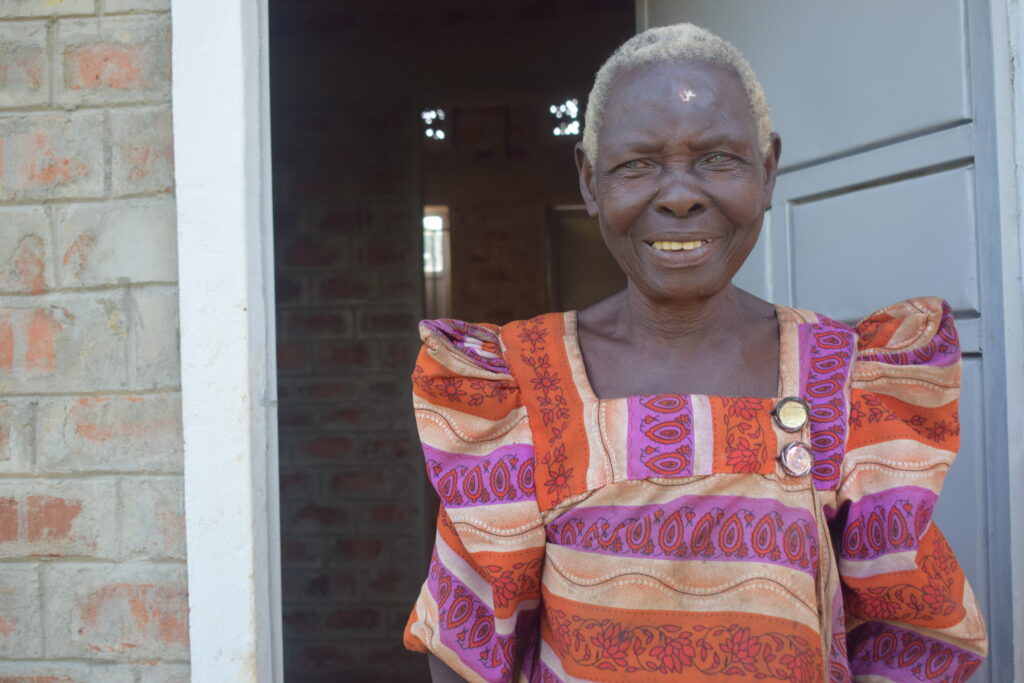Our toilet was not safe, during the day we would use the open pit and at night in case there was need we had to improvise other means.” – Kevina

Kevina’s new house improved her family’s hygiene
85-year-old Kevina is a widow from Lugangu Village, Najja Sub County in Buikwe district whose only daughter passed on and left her with 4 children to look after. The family lived in a small mud house that was prone to collapse any time. It was also roofed with old iron sheets. The house only had one small door, very weak walls and no windows. It was too small to comfortably accommodate all of them. “My house was weak and I wouldn’t sleep well with my grandchildren especially during the rainy season” she recalled.
During the family assessment exercise, one key feature that stood out was that the family had no pit latrine! It was known to the team that it collapsed during heavy rains and they very much depended on an open pit latrine which was very risky for the family especially the grandchildren. “digging a pit latrine requires money or manual labour, at my age, I couldn’t afford to dig another one, my grandchildren are also still young to dig and construct a toilet again”, recounts Kevina, “This new latrine looks more secure and also give us some privacy.”
Another key feature of the family was the limited access to safe water as they shared water with animals from a nearby stream. This affected their sanitation and hygiene conditions. The rain water harvesting system installed will now improve their access to safe water and reduce on the time the children spend looking for clean water. “You may not believe it now but the new house has changed already started changing my life, I am not worried about the rains anymore, my grandchildren now sleep in a clean environment, visitors who used not to visit are now visiting because I have enough space and a nice house,” narrated Kevina, “My home is very beautiful and strong, people passing by always stop by to complement my new house.”

Previously, the family had a challenge of poor hygiene but after the training on promoting clean water, Sanitation and Hygiene practices, Kevina was able to make a hand washing facility/tippy tap where they would all wash their hands after using the toilet and has maintained good hygiene practices in her home especially in the wake of the deadly COVID-19 pandemic. “I taught my children the importance of always washing their hands after using the toilet”, she narrated.
“I will forever be grateful to Habitat for Humanity for giving me a chance of living in a better house with more space and for coming to my rescue in my time of need,” said Kevina.
Housing as an important factor to good hygiene
Access to improved water and sanitation facilities does not, on its own, necessarily lead to improved health. It needs another step: there is now very clear evidence showing the importance of hygienic behaviour — especially hand washing with soap after defecating and before eating or preparing food — to health improvement.
Water and sanitation are essential for life and health, but they are also essential for dignity, empowerment and prosperity. Water and sanitation are human rights, fundamental to every child and adult. But in Uganda, poor sanitation and hygiene, as well as unequal access to safe water, make thousands of children very sick and at risk of death. Diarrhoea alone, one of three major childhood killers in Uganda, kills 33 children every day. Early childhood diarrhoea is not only deadly; it also contributes to Uganda’s high levels of stunting, which in turn affects children’s cognitive development and performance at school. In school, lack of proper sanitation facilities also leads to high absenteeism and dropouts, especially for girls. (Source: UNICEF)
Today Kevina is among the 40,000 families that have benefited from the Vulnerable Group Housing program, (VGH)| a holistic housing approach that empowers vulnerable families in need to live better, empowered and independent lives.


